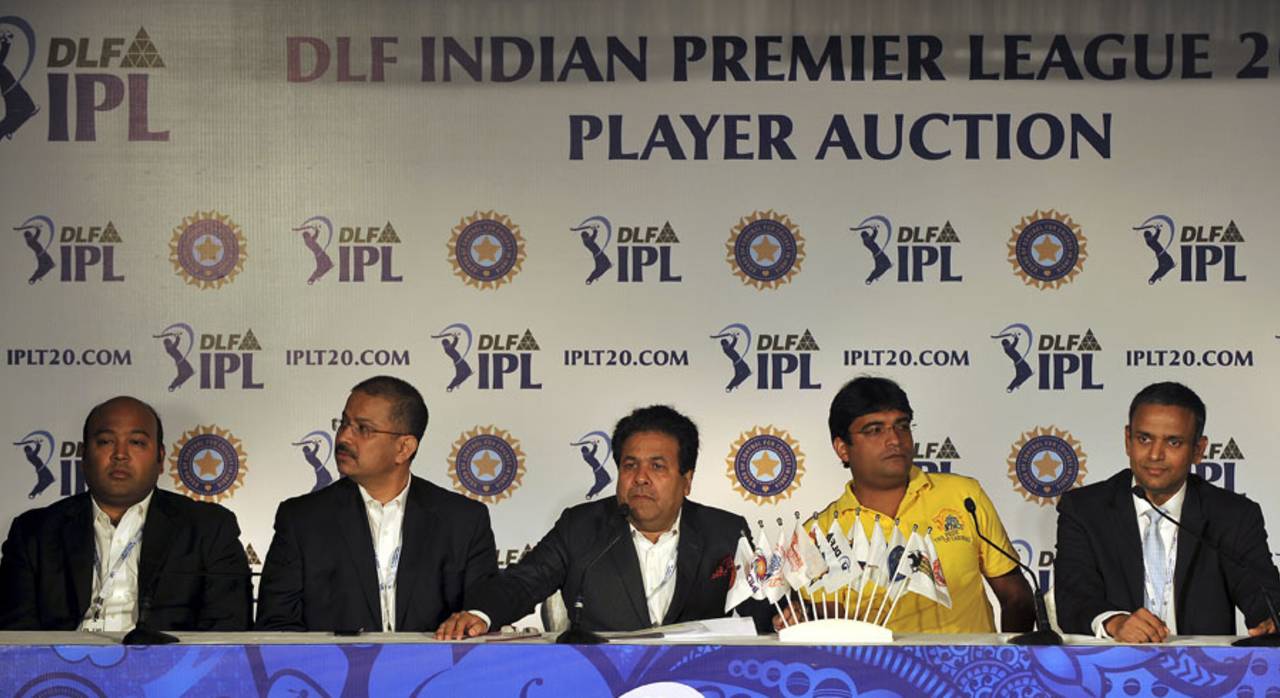The RM Lodha committee appointed by India's Supreme Court has sent an 82-point questionnaire to top board administrators seeking clarity on the way the richest sports body in India functions. This questionnaire, incisive and pointed, is in keeping with the
committee's brief from the court to recommend changes to the BCCI's constitution and manner of functioning.
The questions have been split into eight sections, including understanding how the BCCI and its stakeholders function, the basis and formation of the board's various committees, the board's election process, players' welfare, conflict of interest and transparency in the IPL.
The questionnaire was sent by the committee on April 7 to all those who have held top positions in the BCCI since the IPL corruption scandal broke in May 2013. They included N Srinivasan, Sanjay Jagdale, Ajay Shirke, Anurag Thakur, Sanjay Patel, Ravi Savant, Anirudh Chaudhry, Amitabh Chaudhary and Jagmohan Dalmiya. There was also a request to be present in person to interact with the panel in Mumbai on April 9 and 10. It is understood that Dalmiya and board secretary Anurag Thakur pulled out despite having confirmed last Wednesday evening the schedule of their arrival.
While passing its seminal and wide-ranging order on corruption in the IPL, the court had appointed an independent three-man committee headed by Lodha, a former Chief Justice of India, along with retired Supreme Court judges Ashok Bhan and RV Raveendran. The committee was tasked with determining the quantum of punishment for Gurunath Meiyappan, Raj Kundra and their respective franchises, and also to "examine and make suitable recommendations to the BCCI for such reforms in its practices and procedures and such amendments in the Memorandum of Association, Rules and Regulations as may be considered necessary and proper."
It is understood that the committee, while carrying out the research before it finalised the questionnaire, was concerned about the ad-hoc manner of the BCCI's functioning. So it sought clarity on aspects like the structural component of the BCCI and the IPL, where the BCCI sources its power from, how the elections are conducted, how are the funds allocated to various stakeholders to name a few areas.
One key point in the entire IPL corruption case is the issue of conflict of interest in N Srinivasan, the BCCI president at the time, being the owner of the Chennai Super Kings franchise, facilitated by an amendment to the board's constitution while Srinivasan was secretary. The Supreme Court had struck down the controversial constitutional amendment that allowed board officials to have commercial interests in the IPL and the Champions League Twenty20, calling it "the true villain of the situation at hand."
So the Lodha committee wanted to know whether there is a "consultation process" for amending the Constitution and bye-laws and if the BCCI provides "explanation and justification" for such measures.
It also raised the question as to how would the BCCI establish when a player or a team official had a conflict of interest. "When a player/team official of an IPL team is the employee of the franchisee/owner of another team, does BCCI perceive a Conflict of Interest? What steps are taken prevent such situations?"
Laying special emphasis on player welfare the committee raised 16 questions on the subject including seeking the BCCI's views on if there should be a players association. India is the only country not to have one.
The committee wanted to know whether players form part of the board's constitution and if there is a platform for them to air grievances. "Who negotiates contracts on behalf of the players? Are the players consulted by the Board before team sponsorship and endorsement deals are entered into?" was another key question Lodha's team wanted to know.
Transparency was another area the committee laid emphasis on. Twice the panel pointed out whether there was an independent regulator governing important events such as the board elections. "Is there an independent ombudsman for general oversight over the functioning of the BCCI and IPL and what powers are available to it?" the committee asked. It was also interested to know whether the BCCI or the IPL has "a whistleblower/immunity policy"?
Although majority of the 82 questions were basic in nature, the panel possibly revealed the broad nature of its inquiry in the final question: "Do you have any suggestions to improve the accountability, elections, governance, transparency and general administration of the game, thereby improving overall integrity of cricket?"
Reactions within the BCCI are conflicted. While one official downplayed the issue, saying the process was routine, another insider admitted the questionnaire gives the first indication of the "gravity of ramifications" the report could have on the administration of the game in India.
With inputs from Amol Karhadkar
Nagraj Gollapudi is an assistant editor at ESPNcricinfo
